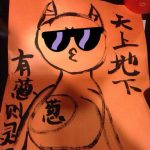MulanIFF2024 Opening Night: LOVE IS A GUN
We are thrilled to announce that the 2024 Mulan International Film Festival will open on August 9th with Love Is a Gun, written, directed, and acted in by Taiwanese director and actor, LEE Hong-Chi.

“Love Is a Gun is my favourite new film of the past few years, and I’m thrilled to have the opportunity to share my liking of it with so many of you. Nothing excites me, stirs my emotions more than expressing ‘liking’ itself. This film is intricate, exquisite yet vigorous, effortlessly transcending me to realms beyond words. My liking of it reveals to me my own incompleteness, for it reminds me I hold undiscovered and unknown truths about myself. Over a month since watching it, it frequently comes to mind and occupies my thoughts.
As a film festival focused on emerging directors, we have a duty to convey to the audience, with all that we possess, the distinctive, highly self-aware creative voices. Of course, we can analyze aspects such as the script, cinematography, acting, and sound. However, before delving into ‘film,’ what first comes to mind is an article I read over a decade ago. The author mentioned that in one nearly extinct language, there are a dozen words to describe the different patterns of water ripples shaped by the wind. I feel a film festival’s role is precisely to recognize those intricacies and nuances, and continually create a possibility to recognize and articulate them.”
—SHEN Wei, Artistic Director
(Translated by Promise XU)
“(S)He that who should be occupied with heavy load work has no need to come and see Love Is a Gun, (S)He that who should date with a capricious beauty has no need to come and see Love Is a Gun, (S)He that who should firmly believe in contemporary film studies discourse, fetishize European film festivals, or idolize Kant, has no need to come and see Love Is a Gun. Should you, from time to time, get lost in words or be still in tongue while cursing, muttering and swearing day and night; or just being, beware of your motive to breathe, then come.
Two minutes ago, SHEN Wei told me that I had 20 minutes to write a recommendation for Love Is a Gun; otherwise, my behaviour would result in disrupting MulanIFF’s release schedule. I don’t follow such logic, but I chose to comply.
In essence, a press release is the master signifier covered by the discourse of university.
The speaker hides that fucking object (not himself nor herself because that is not politically correct, thus, to be fair enough, I equally curse every gender or individual) behind the existing ‘knowledge’ or ‘system’ and puts that fucking object in the position of an imaginary ‘father’ so as to carry out ideological output and value rankings. General recommendations, including Cahier du Cinéma to this day, are dominated by the discourse of university.
I have no interest in being disguised as ‘The Father’ or merely being in the Game of the Father, which, Shen Wei shall fully be conscious of. However, she still chose to play some adventure games, which shall be perfect for the promotion game of Love Is a Gun to be on.
Shall it be a friend, I would carefully enumerate my personal, systematic criteria for judgment on good works, and use those to recommend. Shen Wei mistakenly believed that my recommendation to a wider audience would be in the same vein. However, writing a recommendation on a tight deadline can also be a high-stakes race. Denoting is less than will; meaning is the by-product, which comes after action. I would rather not write any word about this film, if being positioned as the Father in imaginary realm.
Artistic creation, at its core, is the process of externalizing vitality through language. Here, ‘language’ takes the meaning in the general realm of semiotics. For seeing films at a film festival, ‘language’ can be narrowed down to ‘film’ as a medium through which the author expresses their will and consciousness.
MulanIFF was founded to discover and stir up a new wave where filmmakers with the potentials to become Tier-0 (I also name it Échelon-Formidable) artists simultaneously put out to the sea. The introduction of one’s work is complex. The analysis of it is intricate and private. In public discourse, however, describing the common traits of works with the potential for extraordinary, can be succinct:
—Creators who have the ability to create their own language rather than speak under the framework of the language of others are those subjects that own brimming vitality as well as irrepressible death drive, unyielding libido, and continuous potential to produce Échelon-Formidable works. Their expressions can be starkly bold or even crude, their traumas and desires for love shall be ineffably personalized, yet in cinema, the ultimate pervert art, a Fake (Zizek, 2006), they directly traumatize the audience and under the pure and wrong art form of film, they can cause direct trauma to viewers, which will inevitably cause certain discomfort to normal people. But they are alive.
I still don’t understand what love is, nor do I know why loving someone requires me to fire a gun (even if Gun is straightly signified to Phallus). Yet, at the film’s closing, off screen, the moment when I lock eyes, under the gun’s barrel, with the object that is meant to be under the gaze, I feel life.
When life passes through the body, it is a feeling of wanting to yell. When you step into the cinema for this film, may you also feel life under the muzzle of love, yelling, galloping, bumping into the creator’s soul or encountering yourself.”
—Eland ZHU, Programming Consultant
(Translated by Promise XU and Eland ZHU)






